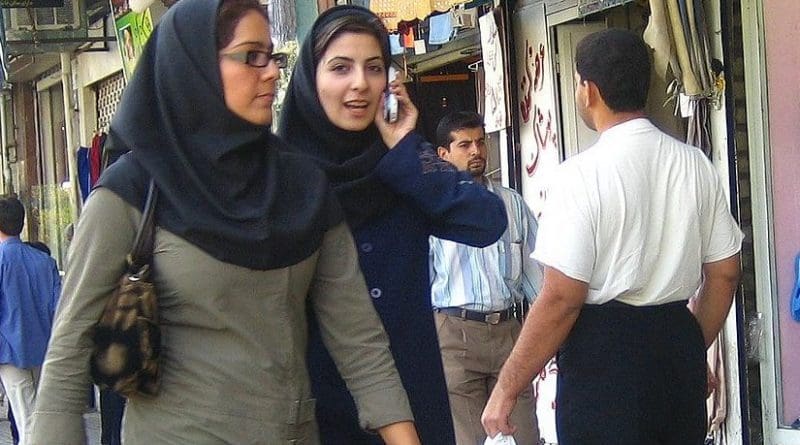Iran: Women Arrested For Dancing, Says HRW
Iranian state television on July 9, 2018, broadcasted apologies by several women who were briefly detained in May for posting videos of themselves dancing on their popular Instagram accounts, Human Rights Watch said. On the same day, Shaparak Shajarizadeh, who took her headscarf off in public in January to protest compulsory hijab laws, announced on her Instagram page that a court sentenced her to 20 years in prison for this act, although it suspended 18 years of the sentence, meaning she has to serve 2 years in prison.
Islamic Republic of Iran Broadcasting (IRIB) television Channel One broadcasted a program called “Devious” on July 9 in which several women and men who appeared to have a large number of followers on Instagram said on camera that they regretted posting their content online. The video appeared to have been recorded when these people were in detention. They included Elnaz Ghasemi, who lives in Canada and was visiting Iran, and Maedeh Hojabri, a teenager, both of whom had been arrested in May by Iran’s cyberspace police and their accounts closed down for posting the videos of themselves dancing, and who had been released a few days later, Ghasemi reported. The program also featured police officers and “experts” talking about how social media platform enables certain abuses and crimes.
“Equal parts abusive and embarrassing, dragging a teenager before the camera to apologize for dancing is a new low for the Iranian authorities,” said Sarah Leah Whiston, Middle East director at Human Rights Watch. “Iran’s authorities should stop harassing all those arrested for exercising their right to free expression.”
Iranian authorities should stop harassing and prosecuting women for exercising their free expression, including online, and repeal discriminatory laws like the mandatory dress code for women, Human Rights Watch said.
In response to widespread criticism, Mohammadhossein Ranjbaran, IRIB’s public relations director, said on June 10 that “judicial authorities had asked [us] to publicize this content.”
Iranian law vaguely defines what constitutes acts against morality, and authorities have long censored art, music, and other forms of cultural expression, as well as prosecuted hundreds of people for such acts. These laws often disproportionally target women and sexual minorities. Since 2016, Iran’s Revolutionary Guards have arrested and interrogated several fashion bloggers, many of them women, who have used Instagram to promote their businesses. Many of those who were interrogated had previously posted photos and videos showing themselves without the hijab and wearing facial makeup.
In December 2017 and January 2018, several women who became known as “the Girls of Revolution Street” took their headscarves off while standing on electric utility boxes across the country to protest Iran’s compulsory hijab law, Shajarizadeh among them. On July 1, Abbas Jafari Dolat Abadi, Tehran’s prosecutor, announced Shajarizadeh’s sentence without mentioning her name. He also said that the prosecutor’s office will appeal the Tehran court’s decision to suspend part of her sentence. In March, a court had sentenced Narges Hosseini, another woman who had also taken off her headscarf in protest, to 24 months in prison, but suspended 21 months of her sentence.
On June 13, the authorities arrested Nasrin Sotoudeh, a prominent human rights lawyer who represents Shajarizadeh and a number of other women who protested the compulsory hijab. Reza Khandan, Sotudeh’s husband, said that a prosecutor in Kashan, where authorities arrested Shajarizadeh for the second time on May 8, had made a complaint against Sotudeh that led to her arrest. It is not clear what charge she is facing in detention.
The enforcement of a compulsory dress code for women in Iran violates their rights to private life, personal autonomy, and freedom of expression, as well as to freedom of religion, thought, and conscience, Human Rights Watch said. It is also a form of gender-based discrimination prohibited under international law.
The International Covenant on Civil and Political Rights (ICCPR), which Iran has ratified, guarantees people’s right to freedom of expression, to privacy, and to freedom of religion. Several United Nations independent experts have criticized rules that require wearing religious dress in public. The late Asma Jahangir, the former UN special rapporteur on freedom of religion or belief, had said that the “use of coercive methods and sanctions applied to individuals who do not wish to wear religious dress or a specific symbol seen as sanctioned by religion” indicates “legislative and administrative actions which typically are incompatible with international human rights laws.”
Human Rights Watch takes no position on whether wearing the headscarf or face covering veils is desirable, but opposes both state policies of forced veiling and blanket bans on the wearing of religious dress (as are applied in some European countries) as disproportionate and discriminatory interference with basic rights.
International law defines the right to freedom of expression to include the freedom to seek, receive, and impart information and ideas of all kinds “in the form of art.” The International Covenant on Economic, Social and Cultural Rights (ICESCR), to which Iran is a party, guarantees respect for “the freedom indispensable for…creative activity.”
“Iran’s ruling establishment has long fought a losing battle against its own population’s culture,” Whiston said. “Yet despite the authorities’ abusive practices, Iranians continue their rich cultural production, especially in the age of social media.”

